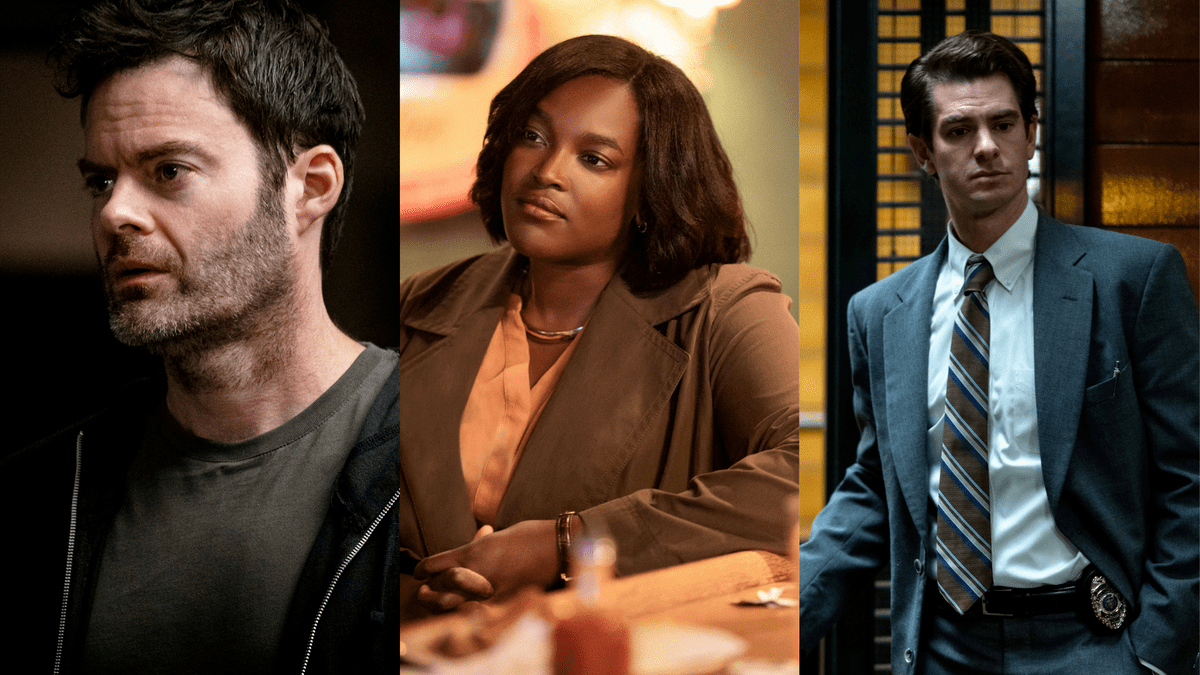
HBO’s favorite hitman/aspiring actor is depressed, out of work, and longing for forgiveness
“Forgiveness is something that has to be earned.”
Over two seasons of Barry, we haven’t really turned to NoHo Hank for moral guidance (politeness may be a virtue, but dude’s a mobster). And yet, there’s the Chechen dandy, speaking truth in the first episode of the third season. Clearly, the world of Barry has changed, and we need a sec to find our feet.
There’s the familiar deadpan gallows humor in the cold open, but something’s off. Barry (Bill Hader) and a betrayed husband have abducted the cuckolder and forced him to dig his grave by a forlorn tree somewhere in the desert hills outside L.A. The enraged husband tells an unshaven, hollow-eyed Barry, joylessly munching a doughnut, to slice off the offender’s eyelids before Barry shoots him. With the soon-to-be-victim begging in the background, Barry shuffles to his car trunk, finds some clippers, and trudges back to the gravesite.
In that half-minute, the husband and cuckolder have suddenly, absurdly reconciled. Jeff asked for forgiveness, and the vengeful husband spontaneously granted it. The hit’s called off. Barry stares blankly at the men giggling with relief—and promptly shoots both in the head. “There’s no forgiving Jeff!” Barry shouts into the wind as he returns to his car. Season three: Mercy can happen in blink. But a happy ending? Not likely.
Never before has Barry slayed out of anything but duty or rage. The opening’s a pitch-black joke, but also a big season statement: Barry may be addicted to murder, doing it out of boredom or irritation. In the first season we saw how killing his ex-Marine pal Chris (to stop him going to the cops about the Bolivian ambush) caused Barry paralyzing levels of guilt. And in the second, Barry tried multiple times to avoid murder, only to be sucked into mindless bloodshed: a spectacularly violent season finale as berserker Barry annihilated a monastery full of Chechens, Bolivians, and Burmese in search of Fuches.
Now he’s depressed. He looks like a junkie. And what’s his fix? Barry imagines a bullet in Sally’s forehead. And Cousineau’s. These imaginary head shots, with bullet impact F/X (wet plunk) and CG blood trickle signal that no one is safe. Barry once daydreamed about starting a family with Sally. He’s horrified.
To be honest, Sally (Sarah Goldberg) has become a bit of a pill. She’s under tremendous pressure as star and showrunner of her own series, Joplin, a family drama about abuse. Barry and Sally live together, but their relationship consists of Barry playing video games on the couch while Sally runs off to another long day of meetings and shoots at the studio. They’ve even got a pre-scripted routine for public displays of affection: Barry brings flowers at lunchtime, but if Sally invites him to stay for lunch, he’ll make an excuse about having an audition. As always in Barry, truth blurs into performance.
Accordingly, the episode (“forgiving jeff”) depicts each character struggling to balance work and personal life. Auditions have clearly slowed down for Barry, who surfs the dark web trying to find jobs on message boards such as “Hitman Marketplace.” These sordid, amateur gigs, which usually involve marital infidelity, give our assassin no joy. Meanwhile, Fuches (Stephen Root) is in exile in the mountains of Chechnya, forced to milk a goat outdoors for his bowl of cereal. Living in a drafty shack in the middle of nowhere, without TV or phone, Fuches is temporarily neutralized (“Hank says you can go home when things have cooled off,” a goon mutters), but you know he’s plotting his return. Cousineau’s career wasn’t exactly going gangbusters before, but in the aftermath of his wrongful arrest for Moss’s death, he seems to have lost his acting class, too. Everyone is either out of work or work has taken over their lives.
Except for Hank (Anthony Carrigan). After the monastery massacre, Hank’s Chechen mob has shrunk to four, who now operate out of an outdoor plant shop (giant banner: PLANTS!). Of course, the business is a front for moving bags of heroin at the bottom of plastic pots. Detective Mae Dunn (Sarah Burns)—who has moved up in the ranks after the death of Loach last season—rolls up with a couple of colleagues to ask Hank some questions down at the station.
“This is, like, my first interrogation. I’m legit nervous,” a visibly excited Hank tells Batir (JB Blanc) as he puts on his best blazer. At the station, Mae produces photographs placing Hank at the monastery around the time of the shooting, and then shows him the Chechen pin (“The Debt Has Been Paid”) that Hank gave to Barry and which Barry put in the trunk with Moss’s body to frame the Chechens for the killing that he did (keep up, please). Mae explains that they believe the two crimes are linked. Unable to hide his panic but thinking quick, Hank points at Fuches in a photograph and identifies him as a super-assassin called “The Raven,” which gets an audible scoff from the cops. “It’s a good name,” Hank protests.
Hank is now aware that Barry framed him for Moss’ murder, yet he puts the blame on Fuches. It’s a safe bet, since Hank is the one keeping Fuches safe in Chechnya. After his facetime with the cops, we follow Hank home to a gorgeous house in the Hollywood Hills (business at PLANTS! must be good), and into the bathroom where Cristobal (Michael Irby), is shampooing his gorgeous black hair. Hank brags that he lost his police-interrogation virginity that day. “I think I aced it,” he says, before stripping and joining Cristobal in the shower. In the next scene they lie on bed watching TV with a bowl of popcorn.
Let’s pause a moment and just say how great it is to see Hank and Cristobal in an adult, loving relationship which is not portrayed as a joke. In previous seasons, Hank’s flamboyance was simply his excessively polite nature, and his breathless bromance with Cristobal a puppyish fixation, but there was always a crypto-gay subtext that skirted the edge of homophobic humor. As with other sexually ambiguous characters on current shows (Kelvin Gemstone, Stede Bonnet), it’s a fine line between characters exploring alternative gender roles and showrunners poking fun at “effeminate” men with intense attachments. It was time for Hank to come out.
That night, Barry, more desperate than ever, appears on Hank’s porch and begs for his help. “I’m in a bad spot. I’m seeing shit that’s not there, I’m kind of losing my mind, man.” Not surprisingly, Hank is unsympathetic, hiding Barry’s presence from Cristobal and telling him to leave. “Forgiveness is something that has to be earned,” Hank says, as I noted earlier, possibly setting the tone for the season. “Now, seriously, fuck off. And try not to frame me on the way out.”
As Hank walks away, Barry gets a text on his phone from Cousineau (Henry Winkler), offering work for money—if Barry can help him clear out the theater. Barry readily agrees.
Ah, yes. Do you think we forgot about Cousineau? After Mae interviews Hank, she calls in Gene, to show him the surveillance photos. Gene fingers Fuches as the man who called himself Kenneth Goulet and led him to Moss’ body. What Gene doesn’t tell the cops is that Fuches, before running off, whispered into his ear, “Barry Berkman did this.”
At home, Cousineau grimly smiles at Barry’s text agreeing to meet. He turns to a velvet-lined box that cradles a handgun. Alec Berg and Hader are always recycling throwaway jokes for extra plot elements. Recall Gene’s despairing line in season two, episode one: “In my bedroom, under the bed, there’s a mahogany box, and in that box is a pearl-handle .38 Special, screen-used from the movie Flashpoint, given to me by my former roommate, Rip Torn.” Once theatrically musing on turning the gun on himself, bereaved Gene will now use it for revenge.
After a fantastically tense scene between Barry and his former mentor, Gene levels the gun at Barry under the desk. “You have two choices,” Gene says in his best tough-guy voice. “Come with me to the station, turn yourself in. Or fucking die.” At that exact moment, of course, the prop gun falls apart, the useless barrel and bullets rolling under the desk and stopping at Barry’s feet. Barry, eyes welling with tears, says, “I’m sorry” and springs at the camera.
You’d expect the episode to end there, but a final scene drags us back to the cold open. Windswept desert, lonely Beckettian tree, Cousineau on his knees begging for his life, Barry pointing gun. The agonized Barry sees an imaginary bullet burrow into Cousineau’s forehead, blood courses down. Barry is about to destroy the one man who cared for him, who saved him. Cousineau is trying every tactic, until finally: “I forgive you!” “Forgiveness has to be earned,” Barry whimpers through tears. “Then fuckin’ earn it!” Cousineau yells back. Barry has a thought. He smiles. For a second, the old Barry appears in Hader’s face. “I know how I can make it up to you.” He raises the gun again. “Get back in the trunk.”
Forgiveness must be earned. But wait, does it? Or will Barry, unable to forgive himself, in the quest to earn forgiveness, make things even worse? All we know is, season 3 is off to one hell of a start, the stakes are higher than ever, and no one is safe.











